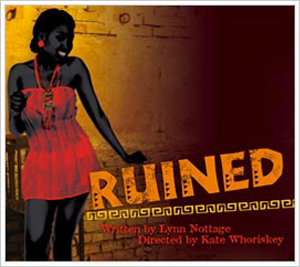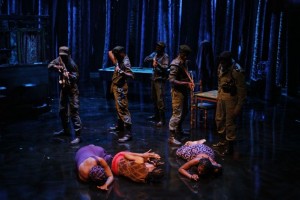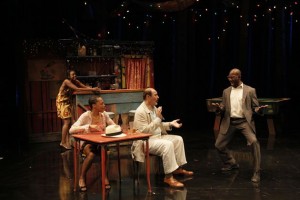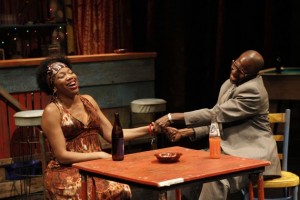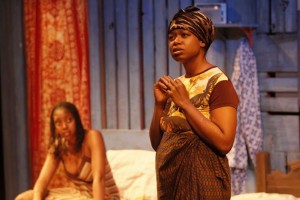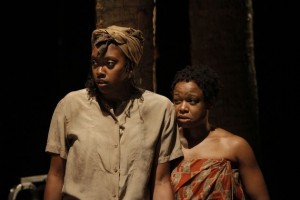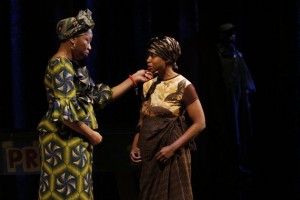RUINED AND SAVED
If history is really an argument without end, then Lynn Nottage, among contemporary American playwrights, is our most compassionate historian. Although I prefer Intimate Apparel for the elegance of its writing and for the freshness of its approach to discovered facts, it is easy to understand why Ruined is her breakout play. It is a work of controlled raw power that imagines what life – in a brothel-bar in the middle of the Ituri rainforest in the Congo during a state of war – might be like.
It will always be impossible to fathom the degree of barbaric cruelty that seems to always take place during wartime, but Ruined goes a long way to help us see, if not the reasons why, the devastating effect such brutality has on its victims, in this case a group of women who are raped, mutilated and “ruined,” and who are then forced to live as prostitutes, often accommodating sexually the very predators who uprooted and destroyed their lives in the first place. A very strong brew, as they say. And Nottage peppers her language with the kind of stinging wit and eloquence that makes tolerable the palpable imagery created by some of the play’s trenchant and sometimes shockingly horrific descriptions of physical and emotional violence in which her characters bare their souls.
It could be argued that the ugliness of these truths goes begging for the audience’s sympathy and that Nottage goes too far in trying to express every possible point of view about the terrors of war in a manner which may invariably bring to mind countless other plays in which the denizens of a bar express themselves politically and intellectually as they reveal their true selves. And one may be taken somewhat aback by the ending which, after all the darkness of the preceding two hours, not only takes us into the light but, in a moment of sheer romanticism, wants the audience to leave feeling morally uplifted and even a trifle sentimental.
Does this vitiate the play itself? For some, it might, but that would not be giving Nottage proper due for her skills as a playwright, i.e. her ability to create memorable characters. Her Mama Nadi, the madame and entrepreneur of the brothel, is as strong and as vivid a human construct as is imaginable: on one hand, she is profiting from the misfortunes of her “girls,” but, even when she is confronted by betrayal, shows, in addition to her rough-and-ready manner, a compassion that gives her ultimate “secret” a credence it would ordinarily not have. This is rampant unapologetic capitalism on one hand, but it is finally laced through a portrait of a woman merely trying to survive in a world dominated by beastly men. The powerhouse performance by the actress known simply as Portia is so wedded to this character it is hard to tell that it is acting at all.
Equally brilliant are the portraits of the other women: Salima, brutalized and newly pregnant, yearning for the life and, above all, the husband she has left behind, but ashamed to face him when he comes looking for her. In the hands of Quincy Tyler Bernstine, she delivers the evening’s most sustained and squeam-inducing reverie of torture; Sophie, lame and despairing, who dreams of surgery that will “fix” her “ruined” condition, but who remains oddly hopeful in ways that say more at times without words, and who is made absolutely authentic by the passion and simplicity Condola Rashad brings to the role; Josephine, kittenish and dangerous at the same time, giving herself with abandon but with instincts that are as murderous as they are sexual, and brought to life by the excellent Cherise Booth. And the voice of reason is provided by the Fanta-slurping Christian, whose flights of verbal drive in the midst of a nervous energy that seems all-consuming, is thrillingly brought to neo-Shavian theatrical life in the charismatic and eccentric portrayal by Russell G. Jones.
Indeed, it might be argued that, while the Pulitzer Prize went to Nottage, it must be shared by these actors and the rest of the ensemble for their richly dedicated work and, even more, to Kate Whoriskey, whose direction is genuinely inspired; she has given the play sweep and drive without stinting on its sense of intimacy and immediacy. And one has not mentioned the musicians and the wonderful music by Dominic Kanza, the extraordinarily beautiful set design by Derek McLane that captures the raffishness of Mama Nadi’s establishment so perfectly, Paul Tazewell’s African-tinged costumes, Peter Kaczorowski’s haunting lighting: the design elements are part and parcel of what makes this production so artistically pure.
Despite a feeling that a less contrived ending might have really brought home the nightmare that Nottage wants to convey, Ruined is what theater is often about: alive and very much in the moment and done with the confidence that its moment is right now.
photos by Chris Bennion
Ruined
Geffen Playhouse in Westwood
ends on October 17, 2010
for tickets, visit Geffen Playhouse
